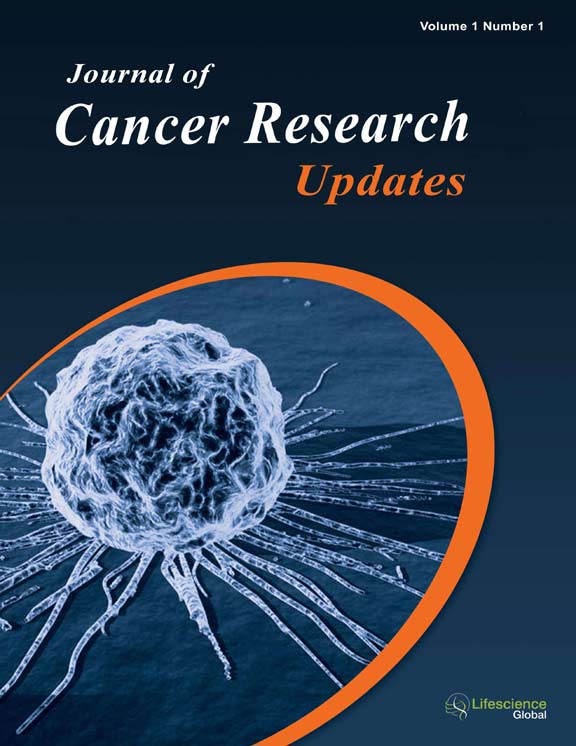jcru
|
|
Abstract: The raspberry (Rubus idaeus) is an economical important berry crop that contains phytochemicals such as polyphenols and flavonoids with potential health benefits. This study addresses the antioxidant and anticancer effects of raspberry and its root extracts. Raspberry and raspberry root were extracted with ethanol, and separated into petroleum ether, chloroform, ethyl acetate, n-butyl alcohol and water fraction. Most extracts showed the powerful activities to scavenge DPPH radical, eliminate hydroxyl free radical ion, and inhibit the growth of human cancer cells, suggesting their promising application on health care. Keywords: Raspberry, antioxidant, anticancer. Download Full Article |
|
|
Abstract: Autophagy is an evolutionarily conserved intracellular self-digestion process, which mediates homeostasis in response to various stresses via degradation of damaged organelles or unnecessary proteins. It has been demonstrated that autophagy involves in tumorigenesis and progression. Autophagy serves either as tumor suppressor or promotor in a context-dependent way. It has been revealed in multiple studies that autophagy plays a pro-survival role upon treatment of anticancer drugs. Thus, combination of autophagy inhibitors with anticancer drugs may provide a desirable strategy to improve therapeutic efficacy. In this review, we summarize recent progress in the process and regulation of autophagy with a highlight in advances in the role of autophagy in cancer treatment. We also summarize some recent clinical outcomes of combinatorial use of autophagy inhibitors and anticancer drugs, and introduce latest discovered selective autophagy inhibitors. Some issues which should be paid attention to during the research to improve the clinical outcomes are discussed. Keywords: Autophagy, cancer therapy, chloroquine, selective inhibitor.Download Full Article |
|
|
Abstract: Breast cancer is a malignant tumour that starts either in the ducts or lobules, this can be generally differentiated as either in situ or invasive (in filtering) type. It is expected that in 2014 every 1 in 8 women are likely to develop invasive breast cancer during their lifetime when compared to a decade back where an average of 1 in 10 was seen. With this increase, breast cancer alone, roughly accounts for 25 to 30% of new cancer cases this year. Despite such diagnostic statistics, there are millions of survivors across the globe and this increasing rate can be attributed to the tremendous increase in advances in treatment and also early diagnosis. New drug delivery carriers like nanoparticles, liposomes, monoclonal antibodies, etc. are being used to improve the efficacy of therapy and for site specific delivery to reduce side effects. As a result of the constant effort by researchers, today the commercial market has a range of products apart from the conventional dosage forms like Herceptin (trastuzumab), a monoclonal antibody; the others in this class are Pertuzumab (Perjeta), Kadcyla (ado-trastuzumab emtansine) used for targeted delivery; Myocet (doxorubicin), a liposomal formulation and Paclitaxel nanoparticles all these are available as injections via intravenous route or infusion in few cases. There are yet certain other promising technologies like magnetic nanoparticle hyperthermia and cMethDNA assay a very assuring method to monitor recurrence of breast cancer by a simple blood test. This review will focus on the description of disease, diagnosis, current treatment therapies and ongoing research to provide better facilities. Keywords: Breast cancer, diagnosis, advancements, treatment, trials.Download Full Article |
|
|
Abstract: Multidrug resistance (MDR) is the major cause of the failure of cancer chemotherapy. Development of MDR reversers is an important strategy to improve the efficacy of cancer chemotherapy. Here, we have found a morpholine derivative of 23-hydroxybetulinic acid, B5H7, with a reversal effect on MDR cancer cells. Our studies showed that B5H7 enhanced cytotoxicity of doxorubicin, but no cisplatin in MDR cancer cells HepG2/ADM. And we found that B5H7 not only increased the intracellular accumulation of P-glycoprotein substrates doxorubicin and rhodamine123, but also reduced the efflux of rhodamine123 in HepG2/ADM cells. Further studies showed B5H7 did not alter the protein level of P-glycoprotein and it also had no effect on P-glycoprotein ATPase activity. Taken together, we have found that B5H7 could reverse doxorubicin resistance in HepG2/ADM cells by inhibiting the transport function of P-glycoprotein. These findings contribute to developing B5H7 as an adjuvant to anticancer chemotherapy with doxorubicin. Keywords: Doxorubicin resistance, ABC transporter, P-glycoprotein, 23-HBA derivative B5H7, HepG2/ADM.Download Full Article |
|
|
Abstract: Cinobufacini has been widely used at oncology clinics in China to treat many kinds of cancers and bufalin is one active compound of it, but the anti-cancer effect and the underlying mechanisms of bufalin on breast cancer cells are still unclear. Our study demonstrated that bufalin could effectively decrease the viability of MDA-MB-231 cells with IC50 values of 152.2 ± 8.0 nM for 24 h and 22.4 ± 2.3 nM for 48 h, respectively. Further study showed that bufalin could trigger MDA-MB-231 cells to undergo apoptosis with up-regulating protein expression of p-JNK/JNK, p53, p-ERK/ERK, Puma and down-regulating protein expression of Bcl-2, supporting the possible application of bufalin to breast cancer treatment. Keywords: Apoptosis, JNK, p53, Bcl-2, MDA-MB-231 cell. Download Full Article |



